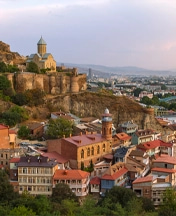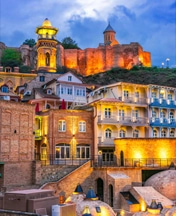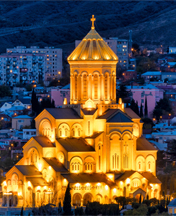The history of Tbilisi is as rich and varied as the city itself. Founded in the 5th century by King Vakhtang I of Iberia, Tbilisi has served as Georgia’s capital for much of its existence. Legend has it that the city was established after the king discovered hot springs while hunting in the area. Impressed by the healing properties of the waters, he decided to find a city around the springs, naming it "Tbilisi," meaning "warm location." Due to its strategic location at the crossroads of Europe and Asia, Tbilisi has long been a centre of trade, culture, and politics. Over the centuries, it was ruled by various empires, including the Persians, Byzantines, Arabs, Mongols, and Ottomans, all of whom left their mark on the city's architecture and culture. In the 12th century, under the reign of King David IV and Queen Tamar, Georgia experienced a golden age, with Tbilisi becoming a major cultural and spiritual hub in the region. In the 13th century, the Mongol invasion brought devastation to the city, but Tbilisi quickly recovered and continued to thrive as a key stop on the Silk Road. Over the following centuries, Tbilisi changed hands multiple times and fell under the control of both the Persian and Ottoman empires. Despite these invasions, the city maintained its cultural vibrancy and resilience, with its diverse population contributing to the development of a rich and unique Georgian identity. Tbilisi became part of the Russian Empire in 1801, marking a period of modernization and urban development. The city rapidly expanded during this time, with new avenues, schools, and theatres being built. Russian architectural influence can still be seen today in some of Tbilisi’s grand 19th-century buildings. In the 20th century, Tbilisi played a crucial role in Georgia's independence movement. After the collapse of the Soviet Union in 1991, Georgia regained its independence, and Tbilisi became the capital of the new sovereign republic. Since then, Tbilisi has undergone a period of rejuvenation and modernization, while still preserving its ancient heritage. Today, the city is a dynamic blend of old and new, where ancient fortresses and churches stand alongside modern skyscrapers. With its long history of resilience and cultural diversity, Tbilisi is a city that tells the story of both Georgia's past and its future. From its ancient roots to its modern transformation, Tbilisi remains a beacon of Georgian identity and pride.














